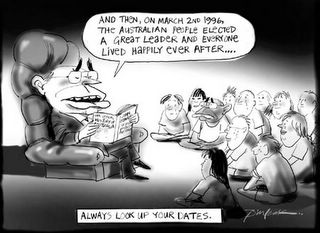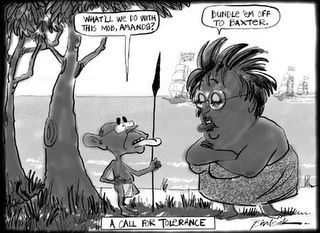A view of Australia's detention of asylum seekers and a search for an antidote to the dictum "might makes right"
Monday, February 27, 2006
True spirit of asylum
The Age reports Kate Durham and her husband, Melbourne QC Julian Burnside, are among 100 artists to support the BID 4 Freedom art auction to be held on Sunday. Durham has donated three pieces of jewellery and a painting, while Burnside’s contribution is a wooden relief. Proceeds from the auction go to the Brigidine Asylum Seekers Project.
Friday, February 24, 2006
whose values?
Costello and Howard are playing the race card again, probably to distract from the Government's culpability in the Iraq wheat scandal. Whenever the Coalition gets worried about electorate disatisfaction it pushes the fear buttons. No wonder Pauline Hanson is on the airwaves claiming vindication!
When Costello rants about Australian 'values' it is cringe making. The 'values' he stands for are about as far removed from what I hold dear as those that characterised the apartheid regime in South Africa in its hey day. The rampant form of xenophobic nationalism being trotted out by Costello and Howard is ugly and is the lowest form of 'politikking'.
But it seems to work in the current climate. It makes me ashamed that the outside world would perceive the 'social Darwinist' values mainstreaming under Howard as quintessentially Australian, but the populist feedback would suggest that many cheer from the sidelines as the boot is put into a religious minority. It is cowardly and malicious and should be anathema in a democratic society. Perhaps we are less democractic than we imagine - this 'dog whistle' politics has the whiff of times past that many people hanker after.
It was not surprising that the Sydney Institute was the venue on this occasion. With the man who saw so little, Gerard Henderson, leading the charge, we get a regular serve out of this apology for a think tank. Why do these people always look like they are suffering from permanent constipation?
When Costello rants about Australian 'values' it is cringe making. The 'values' he stands for are about as far removed from what I hold dear as those that characterised the apartheid regime in South Africa in its hey day. The rampant form of xenophobic nationalism being trotted out by Costello and Howard is ugly and is the lowest form of 'politikking'.
But it seems to work in the current climate. It makes me ashamed that the outside world would perceive the 'social Darwinist' values mainstreaming under Howard as quintessentially Australian, but the populist feedback would suggest that many cheer from the sidelines as the boot is put into a religious minority. It is cowardly and malicious and should be anathema in a democratic society. Perhaps we are less democractic than we imagine - this 'dog whistle' politics has the whiff of times past that many people hanker after.
It was not surprising that the Sydney Institute was the venue on this occasion. With the man who saw so little, Gerard Henderson, leading the charge, we get a regular serve out of this apology for a think tank. Why do these people always look like they are suffering from permanent constipation?
Wednesday, February 22, 2006
Diplomacy key to death penalty dilemma
Writing in the SMH, Lucy Robb says protecting Australians from execution demands more international co-operation.
"SINCE the arrest of the Bali nine last month, a fierce debate has raged over Australia's responsibility to protect its citizens from the death penalty for crimes committed overseas.
Two seemingly irreconcilable positions have emerged. Civil liberties groups have argued that Australians must be saved at all costs, that the Australian Federal Police should be required to make arrests in Australia and that no information should be given to a foreign police force if it will lead to the imposition of the death penalty...The solution is diplomatic, not domestic. The Australian Government must pursue another treaty with Indonesia to ensure that regional co-operation in law enforcement does not lead to the death penalty.
This solution is viable for a number of reasons. It would not affect the ability of the federal police to catch transnational criminals; it does not create a risk that more illegal drugs will enter Australia, nor does it interfere with the judicial independence of the Indonesian courts.
It would merely require an undertaking that prosecutors would not seek the death penalty.
A treaty may be a diplomatic challenge but it would also benefit the security of the entire region by facilitating co-operation between law enforcement agencies for all crimes.
Neither country would be disadvantaged by such an outcome. If Australia is serious about its stance on the death penalty, it will actively pursue such an agreement."
Lucy Robb is the assistant secretary-general, Australian section, International Commission of Jurists. www.icj-aust.org.au
"SINCE the arrest of the Bali nine last month, a fierce debate has raged over Australia's responsibility to protect its citizens from the death penalty for crimes committed overseas.
Two seemingly irreconcilable positions have emerged. Civil liberties groups have argued that Australians must be saved at all costs, that the Australian Federal Police should be required to make arrests in Australia and that no information should be given to a foreign police force if it will lead to the imposition of the death penalty...The solution is diplomatic, not domestic. The Australian Government must pursue another treaty with Indonesia to ensure that regional co-operation in law enforcement does not lead to the death penalty.
This solution is viable for a number of reasons. It would not affect the ability of the federal police to catch transnational criminals; it does not create a risk that more illegal drugs will enter Australia, nor does it interfere with the judicial independence of the Indonesian courts.
It would merely require an undertaking that prosecutors would not seek the death penalty.
A treaty may be a diplomatic challenge but it would also benefit the security of the entire region by facilitating co-operation between law enforcement agencies for all crimes.
Neither country would be disadvantaged by such an outcome. If Australia is serious about its stance on the death penalty, it will actively pursue such an agreement."
Lucy Robb is the assistant secretary-general, Australian section, International Commission of Jurists. www.icj-aust.org.au
Monday, February 20, 2006
Australia needs to argue against the death penalty: Amnesty International
"Australia may be seen as hypocritical as it argues for clemency for two men sentenced to death in Bali for drug trafficking.
That's the concern of Tim Goodwin, the anti-death penalty campaigner for Amnesty International. "The problem for the Australian government is the fact that it's taken such a double standard on the death penalty over the last couple of years, that it's going to be really hard for the government to mount a convincing case against the death penalty when for example, they've approved the death sentence against the Bali bombers."
Indonesia may well respond that Australia is being "hypocritical and selective" about where the death penalty is applied and who should be spared, feels Tim. Andrew Chan and Myuran Sukumaran, were this week sentenced to death, while the others of the so-called 'Bali Nine' have been given life sentences for attempting to traffic heroin.
Australia ought to be arguing against the death penalty in the broader framework of a human rights issue, says Tim; the right to life is a fundamental human right. If Australia is credible and consistent, it would have a stronger case from which to argue that these men should not be executed."
That's the concern of Tim Goodwin, the anti-death penalty campaigner for Amnesty International. "The problem for the Australian government is the fact that it's taken such a double standard on the death penalty over the last couple of years, that it's going to be really hard for the government to mount a convincing case against the death penalty when for example, they've approved the death sentence against the Bali bombers."
Indonesia may well respond that Australia is being "hypocritical and selective" about where the death penalty is applied and who should be spared, feels Tim. Andrew Chan and Myuran Sukumaran, were this week sentenced to death, while the others of the so-called 'Bali Nine' have been given life sentences for attempting to traffic heroin.
Australia ought to be arguing against the death penalty in the broader framework of a human rights issue, says Tim; the right to life is a fundamental human right. If Australia is credible and consistent, it would have a stronger case from which to argue that these men should not be executed."
Friday, February 17, 2006
Public Forum Promotes Understanding About Papuan Asylum Seekers
Australian Greens senator Kerry Nettle says a video statement by a spokesman from the 43 Papua asylum seekers held on Christmas Island in the Indian Ocean will help create awareness in Australia’s public about their situation.
Watch this space for the video statement when it comes available.
Watch this space for the video statement when it comes available.
Wednesday, February 15, 2006
the frightening worry of DIMIA's latest bungles
Project SafeCom is calling for Senator Vanstone to "immediately make public all details of who exactly in the latest round of DIMIA 'lock-em-up and kick-em-out scandals' has fallen victim to the tentacles of her bureaucrats, and in what way they fell foul to her extremist and life-endangering Department," WA Rights Group Project SafeCom commented this morning, and spokesman Jack H Smit added, "and not leave the investigations to ABC Lateline or reporters such as The Age's Andra Jackson, who revealed the Cornelia Rau scandals in January last year."
"The dealings of DIMIA are now well and truly of the highest public interest, and all energy should now be mobilised so citizens, interest groups and NGO's can find their role and start to develop concise, safe and sound strategies in protecting vulnerable Australian citizens and residents from a government department that may well be compared to the Italian Mafia gangs who snatch people and make them disappear," spokesman Jack H Smit commented.
"DIMIA is so dysfunctional that it's damaged and probably unrecoverable for another decade, and as long as the Prime Minister stubbornly keeps sponsoring inhumane policies, the DIMIA will be unable to redeem itself: at the heart of its sickness is the demand that mandatory detention stays in place. We saw that when the West Papuans were shipped to the remoteness of Christmas Island last month, and we saw it when that same Department booked 140 aircraft seats to forcibly deport one person from Australia last month."
"It has come to the stage where the Ombudsman uses words like "bad luck" in his report if DIMIA makes you disappear. As Project SafeCom has stated on many occasions since the Cornelia Rau revelations, everyone, and that includes especially refugees and asylum seekers, should be protected from falling into the claws of DIMIA, and the latest report of the Ombudsman once more strengthens the case for refugee assessment to be taken out of the hands of DIMIA and for all supervision of this process to be put into the hands of the Human Rights and Equal Opportunities Commissioner."
"The dealings of DIMIA are now well and truly of the highest public interest, and all energy should now be mobilised so citizens, interest groups and NGO's can find their role and start to develop concise, safe and sound strategies in protecting vulnerable Australian citizens and residents from a government department that may well be compared to the Italian Mafia gangs who snatch people and make them disappear," spokesman Jack H Smit commented.
"DIMIA is so dysfunctional that it's damaged and probably unrecoverable for another decade, and as long as the Prime Minister stubbornly keeps sponsoring inhumane policies, the DIMIA will be unable to redeem itself: at the heart of its sickness is the demand that mandatory detention stays in place. We saw that when the West Papuans were shipped to the remoteness of Christmas Island last month, and we saw it when that same Department booked 140 aircraft seats to forcibly deport one person from Australia last month."
"It has come to the stage where the Ombudsman uses words like "bad luck" in his report if DIMIA makes you disappear. As Project SafeCom has stated on many occasions since the Cornelia Rau revelations, everyone, and that includes especially refugees and asylum seekers, should be protected from falling into the claws of DIMIA, and the latest report of the Ombudsman once more strengthens the case for refugee assessment to be taken out of the hands of DIMIA and for all supervision of this process to be put into the hands of the Human Rights and Equal Opportunities Commissioner."
Australia must take stronger stand against death penalty
The Age Editorial sets out the case for Australia doing more to protect its citizens.
By contrast, in the case of the Bali Nine, the AFP went out of its way to put Australian citizens in harm's way. I was sick to the stomach listening to the AFP officer (Mike Phelan) the other night on Australian Story mounting a defence of his action. This was a very cynical exercise that netted no longer term intelligence on the drug trade. However it did offer up Australians as 'sacrifices' in a sleazy bilateral deal that has all the hallmarks of certain 'operators' within this government. They will have Australian blood on their hands and their actions should be brought into a very public spotlight.
By contrast, in the case of the Bali Nine, the AFP went out of its way to put Australian citizens in harm's way. I was sick to the stomach listening to the AFP officer (Mike Phelan) the other night on Australian Story mounting a defence of his action. This was a very cynical exercise that netted no longer term intelligence on the drug trade. However it did offer up Australians as 'sacrifices' in a sleazy bilateral deal that has all the hallmarks of certain 'operators' within this government. They will have Australian blood on their hands and their actions should be brought into a very public spotlight.
Thursday, February 09, 2006
Vanstone the pensive...

In a 'chat' with her public servants Senator Vanstone said that she had endured private setbacks last year, as well as the scandals that engulfed the department, including suffering a burst eardrum after 17 plane landings in three days and the death of her dog, Fred. I wonder if a sharp pencil was involved!
She also admonished her officials to "Let the media know about the good things you do." That would'nt take long...
Vanstone confesses to 'another Rau'
The Age is reporting that this charming woman is girding her departments's collective loins for another Cornelia Rau type stuff up. I shudder to think given the numbers of Australians already revealed to have been detained by DIMIA. It was only a matter of time before another horrendous case hit the air waves. Watch this space!
Wednesday, February 08, 2006
Putin against death penalty
Tass reports that Putin recently stated his opposition to the death penalty in a media interview. “You know my personal attitude to death penalty. I have expressed it many times in public,” Putin told the Spanish media. “Any punishment has several goals, including reformation and retribution. There cannot be any reformation in death penalty. This is just retribution. It is even unclear who is punished, because the liquidated person feels nothing, and the society does, because it assumes a right to kill. It often happens that court orders to kill a wrong person,” Putin told the Spanish media.
Such cases happen “not only in Russia but in other countries, as well,” he said.
“Many other countries, which are still called civilized and pillars of democracy, preserve death penalty. These include the United States and Japan,” Putin said.
Clearly Russia is ahead of its erstwhile foe in realising the dangers of state sanctioned murder, especially given the propensity for law enforcement authorities to get it wrong.
Such cases happen “not only in Russia but in other countries, as well,” he said.
“Many other countries, which are still called civilized and pillars of democracy, preserve death penalty. These include the United States and Japan,” Putin said.
Clearly Russia is ahead of its erstwhile foe in realising the dangers of state sanctioned murder, especially given the propensity for law enforcement authorities to get it wrong.
Monday, February 06, 2006
Friday, February 03, 2006
Singapore's open sore - a breach of international law
The Asia-Pacific Human Rights Network reports on the state of human rights in Singapore: "Singapore, though enjoying a reputation of being wealthy and progressive, falls significantly short when it comes to compliance with international human rights standards. The execution of an Australian, 25-year-old Tuong Van Nguyen, for trafficking 396 grams of heroin attracted widespread condemnation of Singapore’s notorious mandatory death penalty, and rightly so. In a statement, the UN Special Rapporteur on extrajudicial, summary or arbitrary executions, Professor Philip Alston, said that “making such a penalty mandatory – thereby eliminating the discretion of the court – makes it impossible to take into account mitigating or extenuating circumstances and eliminates any individual determination of an appropriate sentence in a particular case”.
Singapore is believed to have the highest per capita execution rate in the world and has executed more than 400 people since 1991, 70 percent of which are reportedly for drug offences.
Under the Misuse of Drugs Act (MDA), judges must administer the death penalty to any person trafficking more than 15 grams of heroin and may not consider any extenuating circumstances or mitigating factors in a particular case.
Van Nguyen’s case, it is hoped, will impress upon the international community the need to closely scrutinise Singapore’s human rights record, and critique it where necessary. Singapore’s glittering prosperity conceals a number of horrifying abuses, and it is time the international community took note of some of these concerns."
Doubtless more howls of abuse will emanate from various members of the 'citizenry' protecting the walled states' 'sovereign' right to violate human rights, but if you accept that line you would say it was not the business of the international community to question the 'sovereign' right of Pol Pot, Idi Amin et al to brutalise and butcher people with immunity. The identification and prosecution of leaders that commit crimes against humanity falls within an international jurisdiction and Singapore should get used to closer and closer scrutiny.
Singapore is believed to have the highest per capita execution rate in the world and has executed more than 400 people since 1991, 70 percent of which are reportedly for drug offences.
Under the Misuse of Drugs Act (MDA), judges must administer the death penalty to any person trafficking more than 15 grams of heroin and may not consider any extenuating circumstances or mitigating factors in a particular case.
Van Nguyen’s case, it is hoped, will impress upon the international community the need to closely scrutinise Singapore’s human rights record, and critique it where necessary. Singapore’s glittering prosperity conceals a number of horrifying abuses, and it is time the international community took note of some of these concerns."
Doubtless more howls of abuse will emanate from various members of the 'citizenry' protecting the walled states' 'sovereign' right to violate human rights, but if you accept that line you would say it was not the business of the international community to question the 'sovereign' right of Pol Pot, Idi Amin et al to brutalise and butcher people with immunity. The identification and prosecution of leaders that commit crimes against humanity falls within an international jurisdiction and Singapore should get used to closer and closer scrutiny.
A I reports on Papuans seeking asylum
Amnesty International has been monitoring the civil and political situation in West Papua for many years. "Serious human rights violations, including extrajudicial executions, "disappearances", torture and ill-treatment and arbitrary detentions, have taken place for many years in Papua Province where there is an ongoing struggle for independence from Indonesia. Members of local human rights organisations have been harassed and intimidated as a result of their work, and some have been forced to leave the province. Grave human rights violations have also taken place in the context of both peaceful and violent protests in support of independence."
AI's 2004 report on human rights in Indonesia outlines the repression of the West Papuan independence movement and details specific cases of abuse.
Barnaby Joyce et al have visited Christmas Island to interview the 43 asylum seekers. Barnaby reckons they appear 'genuine', decent people (he is generous with his judgements to a fault), but he wants to hear the other side of the debate. Well, I suggest he and his parliamentary colleagues do their homework for a change and find out just how Australia is complicit in serious human rights violations in our region under the guise of 'national interest'.
AI's 2004 report on human rights in Indonesia outlines the repression of the West Papuan independence movement and details specific cases of abuse.
Barnaby Joyce et al have visited Christmas Island to interview the 43 asylum seekers. Barnaby reckons they appear 'genuine', decent people (he is generous with his judgements to a fault), but he wants to hear the other side of the debate. Well, I suggest he and his parliamentary colleagues do their homework for a change and find out just how Australia is complicit in serious human rights violations in our region under the guise of 'national interest'.
Subscribe to:
Comments (Atom)










